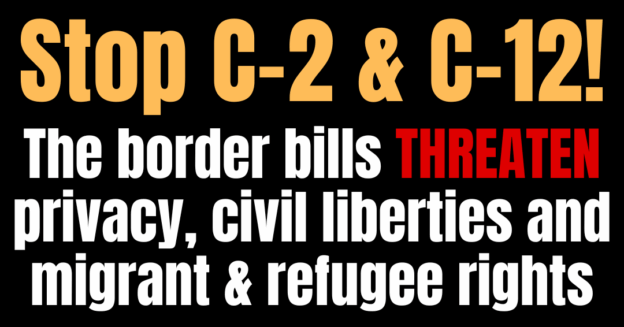
October 4, 2025 Ottawa protest against the genocide in Gaza. Credit: Brent Patterson
Today marks two years of the genocidal campaign by Israel against Palestinians in Gaza, in the name of fighting terrorism. An estimated 65,000 Palestinians have been killed, with total casualties estimated by the former chief of the Israeli Defence Forces to be more than 200,000. Of those killed, almost a third are children. Many more are dead, buried under the rubble.
That is in addition to more than 100 years of colonization, occupation, apartheid regime and oppression faced by the Palestinian people in the wake of the Balfour Declaration and the founding of Israel.
As a coalition that came together in 2002 to protect and promote human rights in the context of the so-called ‘war on terror’, the International Civil Liberties Monitoring Group (ICLMG) reiterates its opposition to human rights violations, violence against civilians and the curtailing of fundamental freedoms.
It is appalling and unacceptable that Canada continues to be complicit in Israel’s genocide despite the opposition of a majority of Canadians to the federal government’s actions.
The Canadian government has continued to lie to Canadians by saying it is no longer allowing arms to be sent to Israel, despite a recent damning report exposing the hundreds of shipments and hundreds of thousands of bullets sent to Israel.
The last year has seen mounting criminalization of Palestinian solidarity. Samidoun, also known as the Palestinian Prisoner Solidarity Network, was added to the list of “terrorist entities,” in a move that many have denounced as an attempt to intimidate the entire Palestine solidarity movement with threat of criminalization.
For the last two decades, the ICLMG has called for the terrorist entities list to be abolished given that it is, among many other things, a discretionary, politicized, and due process-violating instrument.
The ICLMG also denounces the smear campaigns, surveillance, harassment, fining and criminalizing of people, in Canada and abroad, for expressing support for the rights of Palestinians, and their opposition to Israeli occupation and the ongoing genocide. In particular, we condemn the conflation of Charter-protected expression and dissent with “support for terrorism,” the violent arrests of peaceful protestors, and the adoption or consideration of “bubble zone” laws in multiple cities across Canada, which ban or limit protests across vast areas of cities, violating freedom of assembly.
Thankfully, many of the fines and charges against anti-genocide protesters have been dropped or their cases have been resolved without convictions, including against Ottawa protesters for using megaphones and the Toronto Indigo 11. Their lives were severely disrupted, though, most likely leading others to think twice before exercising their right to peaceful dissent. More than 133 pro-Palestine protesters have been charged since 2023. Many charges are still pending; the rest have ended in withdrawals or discharges.
Instead of addressing the over-policing of protests, though, the federal government recently introduced Bill C-9, the Combatting Hate Act, which will give police discretionary powers to determine what symbols are hateful and to discern protestors’ intentions. Passing this legislation would criminalize dissent, violate freedom of assembly and chill free expression. This bill is one more attempt to criminalize pro-Palestine and anti-genocide protesters, and must be withdrawn.
One year later, we are dismayed that we must reiterate our 2024 calls to action:
- Canada must enact a two-way embargo on arms transfer and stop all military support to Israel (including support via the US).
- Canada must stop considering all Palestinians as potential security threats, welcome the Gazan families of Palestinian Canadians accepted through the “emergency” program, and reopen the program to process more applications to save more lives before it’s too late.
- Canada must meet its obligation under international law to do everything in its power to stop the genocide.
The ICLMG remains steadfast in its mandate and commitment to protect civil liberties in the context of the so-called war on terror and its legacy, which includes the genocide in Gaza and the repression of people taking action and calling for an end to the ongoing violence and human rights violations.
The ICLMG is a national coalition of Canadian civil society organizations that was established in the aftermath of the rushed adoption of the Anti-terrorist Act of 2001. The coalition brings together 45 NGOs, unions, professional associations, faith groups, environmental organizations, human rights and civil liberties advocates, as well as groups representing immigrant and refugee communities in Canada.



